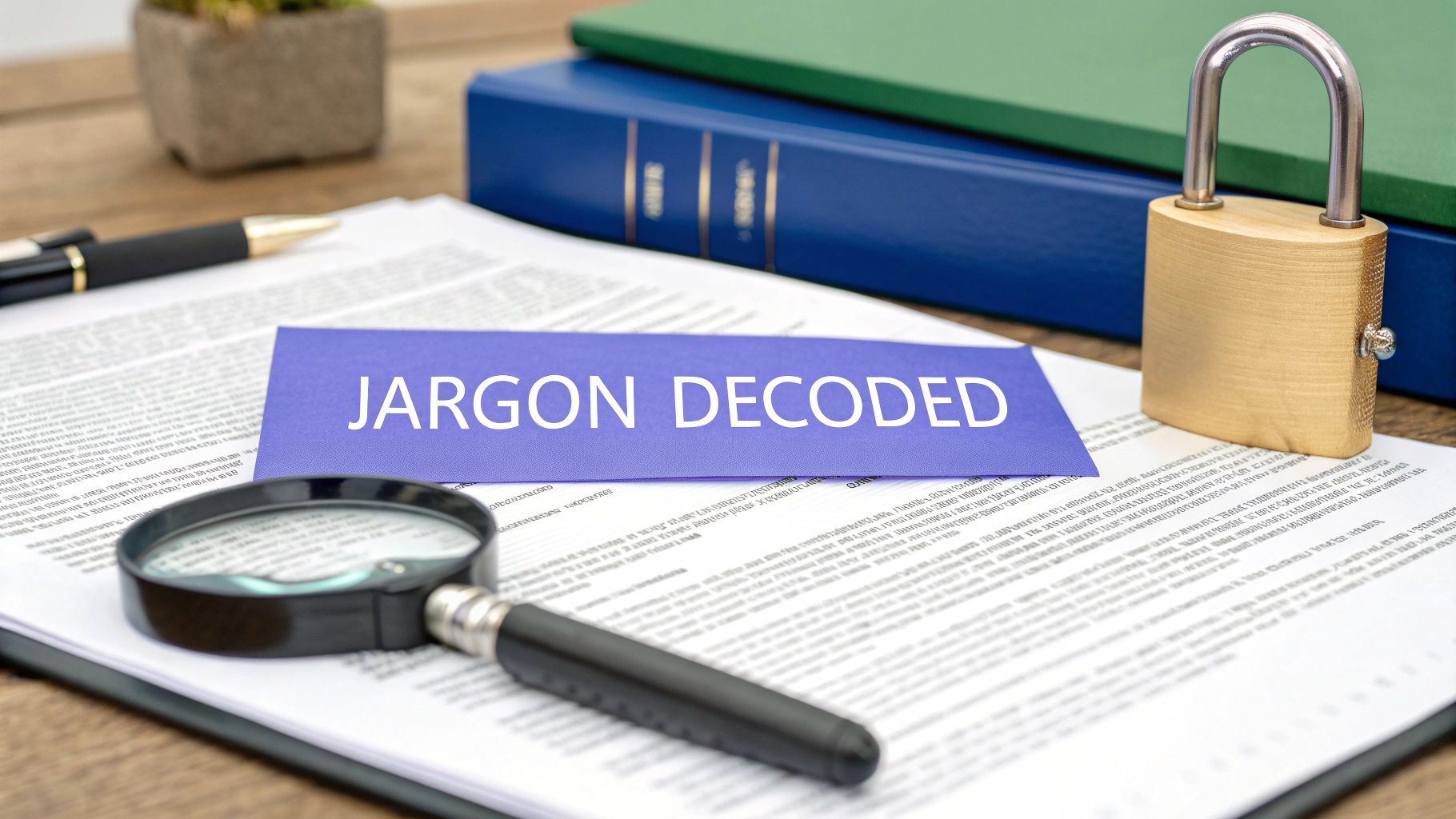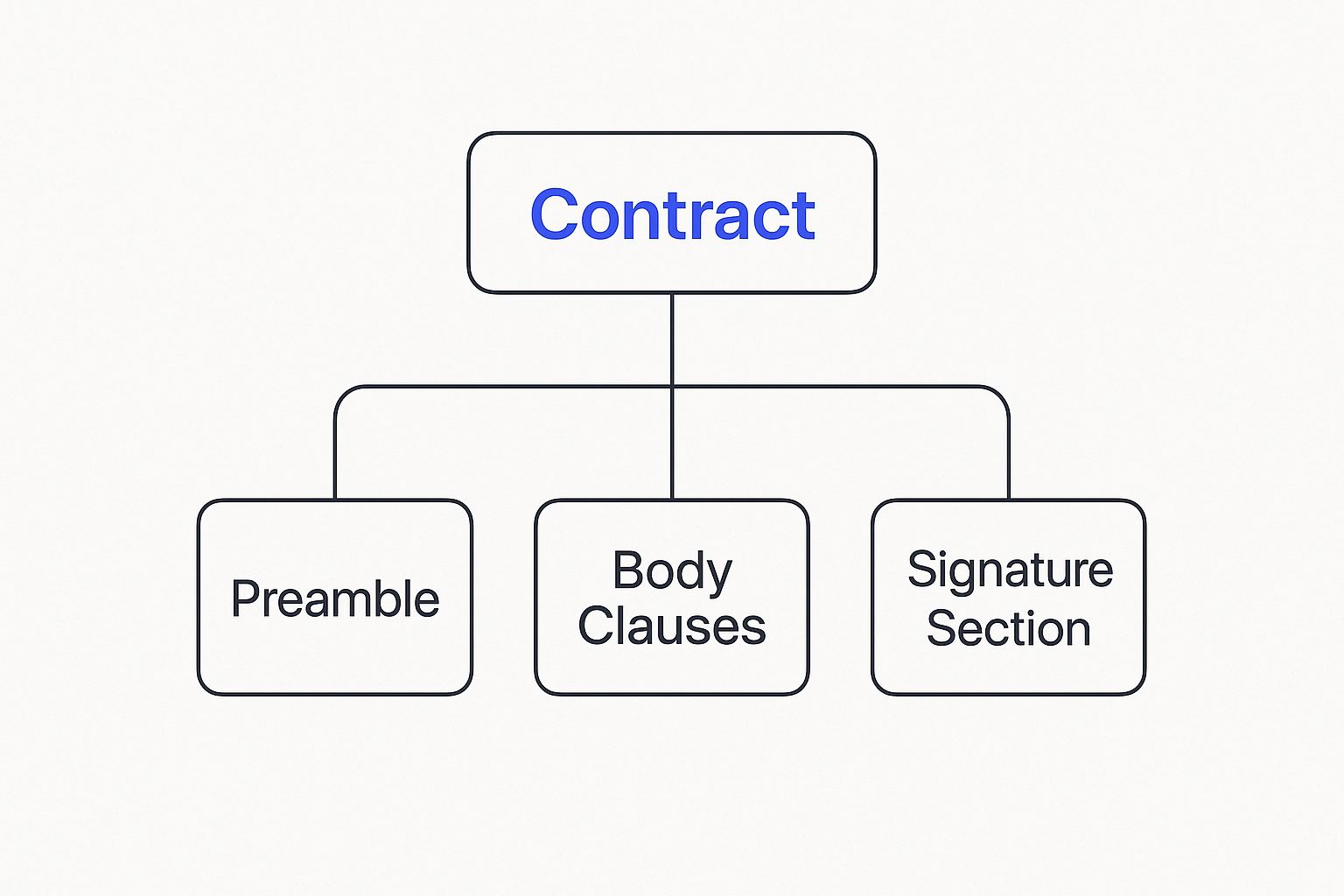
Why Legal Language Feels Like a Secret Code
Imagine trying to read a contract and suddenly feeling lost in a maze of confusing words. Legal language wasn't designed to be a secret code, but it has certainly evolved into something that feels that way for many people. Its history spans centuries, developing with a focus on precision and leaving many of us scratching our heads.
The journey of "legal jargon explained" is an interesting one. Much of this language has roots in medieval Latin, a language few people understand today. Think of words like "heretofore" (meaning "before"). Or phrases like "party of the first part," which often simply means "you." These examples highlight how legal language can create unnecessary complexity.
A History of Jargon
This complexity wasn't always deliberate. Historically, legal documents were written for lawyers, judges, and other legal professionals. The goal was to create airtight phrasing that would hold up in court, not to make the document accessible to the average person. This led to a system where specialized knowledge became essential for navigating even the simplest legal matters.
The legal field is also known for its resistance to change, holding onto tradition even when simpler, clearer alternatives exist. This tendency contributes to the continued use of archaic language. It's like an old, familiar tool that, while cumbersome, is still preferred over a newer, more efficient one.
Decoding the Code
Understanding the historical context of legal jargon is the first step toward confidently navigating legal documents. Whether you're dealing with a lease, an employment contract, or online terms of service, recognizing why legal language is structured the way it is empowers you to decode it. It's like understanding the rules of a game – once you know them, you can start playing strategically.
Learning to recognize common legal terms and their simpler equivalents is key to unlocking real understanding and control over your legal rights and responsibilities. For a deeper dive into understanding legal documents, check out this helpful resource: Understanding Legal Documents. It's like having a trusted guide to help you navigate the complexities of legal language.
To make this decoding process easier, let's look at some common legal terms and their plain English translations:
To help illustrate this, let's take a look at a table comparing common legal jargon with its plain English equivalent.
Common Legal Jargon vs. Plain English Translation Side-by-side comparison of frequently encountered legal terms and their everyday meanings
| Legal Term | Plain English Meaning | Example in Context |
|---|---|---|
| Heretofore | Before | "All sales heretofore made are valid." |
| Party of the First Part | You (or the first person/entity named in the contract) | "The Party of the First Part agrees to..." |
| Shall | Must/Will | "The tenant shall pay rent on the first of each month." |
| Notwithstanding | Despite | "Notwithstanding any other provision, this clause shall prevail." |
| In the event that | If | "In the event that the payment is late..." |
This table provides a practical guide for deciphering some of the most common legal phrases you’ll encounter. By recognizing these and other examples of legal jargon, you can begin to break down the barriers to understanding your rights and responsibilities.
By familiarizing yourself with these common translations, you can start to see through the legal jargon and focus on the actual meaning of the agreement. It's like learning a new language – the more you practice, the more fluent you become.
The Real Cost of Legal Confusion in Daily Life

Imagine signing an employment contract, like Sarah did, only to discover later you unknowingly waived your right to sue your employer. Or picture David, mistakenly believing the term "liquidated damages" meant he'd get a refund. These scenarios, unfortunately, aren't uncommon. They illustrate how easily confusing legal terms can create real problems for everyday people.
This kind of confusion creates a significant barrier between people and the justice system. It prevents individuals from fully understanding their rights and obligations, often leading to unfair outcomes.
Access to Justice: A Global Challenge
The struggle to understand legal language isn't limited to certain groups or locations; it's a worldwide issue. Take the concept of "liquidated damages," for example. This term actually refers to a pre-agreed amount one party pays to another if they breach the contract. It's often misunderstood. This misunderstanding can result in people accepting unfair settlements or losing money they are rightfully owed.
This highlights why clear explanations of legal jargon are so important for everyone, regardless of their legal knowledge. Access to justice is directly linked to how well people understand legal language.
The World Justice Project's Rule of Law Index 2023 found that justice systems are becoming less effective in many countries, with civil justice – meaning how efficient, affordable, and accessible the system is – declining in a large number of places. Since 2016, the rule of law has weakened in 78% of countries studied. By 2023, over 6 billion people lived in countries where the rule of law has eroded. This underscores the critical need for legal language that everyone can understand.
The Plain Language Movement: A Step Towards Clarity
The good news is there's a growing movement pushing for plain language in legal documents. Lawyers and judges are realizing that understanding justice shouldn't require a law degree. They are advocating for clearer, more concise language in contracts, court documents, and legal advice.
This change benefits everyone. It empowers individuals to understand their rights and obligations, which leads to fairer outcomes. It also simplifies the legal process, cutting down on time and costs associated with explaining and interpreting complex wording.
Identifying Unnecessary Complexity
A key skill in navigating legal documents is recognizing when complexity is truly needed and when it’s just leftover tradition. Some legal ideas are complex by nature and require precise language. But often, complicated jargon just obscures meaning, creating unnecessary barriers to understanding.
By learning to separate essential complexity from unnecessary jargon, you can concentrate on the most important parts of legal documents. This empowers you to make well-informed choices and protect your rights effectively. Ultimately, it’s about giving people the confidence and clarity they need to navigate legal matters.
Decoding Contract Terms That Actually Impact You

This infographic gives us a simple breakdown of a contract's structure: the Preamble, Body Clauses, and Signature Section. It's a helpful visual showing how contracts flow from introductions and key agreements to the final signatures. Now, let's explore the core terms within those body clauses that truly deserve your attention.
Legal jargon can be intimidating, but not every term requires intense scrutiny. Some are crucial, others are just formalities. Think of a contract like an iceberg—the most important parts are hidden beneath the surface. This section focuses on practical legal terms you'll likely encounter in everyday contracts, such as rental agreements, employment contracts, and service agreements.
Key Contract Terms You Need To Know
Understanding these key terms can help you navigate contracts with confidence and avoid potential problems. It's all about making informed decisions and protecting your rights.
Governing Law: This clause determines which state's laws will be used to interpret the contract. Let's say you sign a contract in California, but the contract states that New York law governs. This means New York's legal rules will apply, even though you signed it elsewhere. This can have a big impact on your rights and how disputes are resolved.
Indemnification: Think of this as a risk-shifting clause. One party agrees to cover the losses of another under certain conditions. Imagine you're renting an apartment and you agree to indemnify the landlord for any damage caused by your guests. If a friend accidentally breaks a window, you're on the hook, not the landlord.
Termination Clause: This explains how and when the contract can end, either by choice or because of a breach. It's crucial to understand how you can end the agreement without penalty, as well as the consequences of breaking the contract.
Force Majeure: This clause deals with the unexpected – events outside anyone's control, like natural disasters or pandemics, that prevent a contract from being fulfilled. It outlines who bears the responsibility for losses or delays. This is vital for understanding your obligations during extraordinary situations.
Entire Agreement: This clause clarifies that the written contract represents the complete and final agreement between the parties. Any prior verbal agreements or promises that aren't in the written contract are not legally binding. This is why "get it in writing" is such common advice.
To help you visualize the impact of these terms, let's look at some examples.
Introducing a table to summarize key terms: The table below, "Essential Contract Terms and Their Real-World Impact," outlines some common legal terms and explains their practical consequences. This table will help you quickly grasp the importance of each term and what questions you should be asking.
| Contract Term | What It Really Means | Why It Matters to You | Questions to Ask |
|---|---|---|---|
| Governing Law | Determines which state's laws apply to the contract. | Impacts how the contract is interpreted and disputes are resolved. | Which state's laws are most favorable to me? |
| Indemnification | One party agrees to cover the losses of another. | Shifts risk and can make you liable for others' actions. | Under what circumstances am I responsible for covering losses? |
| Termination Clause | Outlines how and when the contract can be ended. | Determines your options for ending the agreement and potential penalties. | What are my options for ending the contract early? What are the penalties for breach? |
| Force Majeure | Addresses unforeseen events that prevent contract performance. | Protects against uncontrollable circumstances. | What events qualify as force majeure? Who bears the risk in these situations? |
| Entire Agreement | The written contract is the complete agreement. | Prevents disputes over prior verbal agreements. | Are all important agreements reflected in the written contract? |
This table provides a quick reference for understanding the potential impact of these key terms on your contractual agreements. Remembering these points can save you time and potential headaches down the line.
Efficient Contract Review Strategies
Efficiently reviewing contracts involves knowing where to focus. Look for "red flag" terms that warrant extra attention. These might include overly broad indemnification clauses, automatic renewals, or restrictive non-compete agreements. Never hesitate to ask questions about anything you don't understand.
For more help understanding legal terminology, check out Legal Terms for Dummies. This resource provides further explanations and examples to help you become more comfortable with contract language. By recognizing these crucial terms and adopting effective reading strategies, you can confidently identify the language that protects you and spot clauses that might limit your rights.
How Technology Is Making Legal Language Accessible

Imagine effortlessly understanding every detail of a legal document, as if a friendly expert were explaining it to you. That's the promise of how technology is transforming our relationship with legal language. We're moving toward a future where grasping the nuances of contracts and legal agreements is no longer a challenge.
AI-Powered Tools: Decoding Legalese in Real-Time
This shift is powered by the rise of AI-powered tools. These tools can decipher complex legal terminology – often called "legalese" – in real time, providing clear explanations. Think of it like having a real-time translator in your pocket, but for legal documents. Imagine reviewing a contract, and an app on your phone scans the document, highlighting and explaining key terms as you read.
This kind of technology bridges the gap between confusing jargon and plain English, making the contract much easier to understand. More advanced platforms can even analyze legal risks, providing a deeper insight into potential problems lurking within the fine print.
This technology isn't just benefiting consumers. Legal analytics are changing the way lawyers work, too. AI-driven tools can help lawyers write clearer documents by spotting potentially confusing language and suggesting simpler alternatives. So, technology might be making contracts easier to understand even before you see them.
Legal analytics and artificial intelligence (AI) are redefining how legal jargon is identified, explained, and used. AI-driven tools now analyze vast amounts of data to identify patterns, anticipate outcomes, and even interpret the meaning of complex legal terms. According to LexisNexis, legal analytics, which involves examining information from extensive datasets, empowers computers and people to spot trends, recognize patterns, and make predictions with a greater degree of accuracy. Discover more insights about legal analytics.
Democratizing Legal Understanding
From simple contract review apps to sophisticated legal analysis platforms, technology is making legal information more accessible than ever before. These tools give individuals and small businesses the power to understand their rights and obligations, creating a more balanced legal playing field. Contracts become less intimidating and more transparent, allowing everyone to participate in legal matters with confidence.
This increased accessibility also leads to fairer negotiations and fewer misunderstandings stemming from complicated legal terms.
Practical Tools for Everyone
Many practical tools are available right now to help you decode legal jargon. A number of mobile apps offer quick definitions and explanations of legal terms. Some even include contract scanning features to highlight essential clauses.
For a more detailed analysis, several online platforms provide AI-powered document review and analysis. These tools can help you identify key provisions, potential risks, and even suggest alternative wording.
By using these tools, you can save time and gain a better understanding of the legal documents you encounter. This empowers you to make more informed decisions and navigate legal discussions with greater confidence.
Surviving The Digital Legal Landscape
Remember paper contracts? Seems like a lifetime ago, right? Now, legal lingo pops up everywhere, from that app you just downloaded to the constantly shifting sands of social media terms. It's a digital deluge of legal information, and it's easy to feel overwhelmed. Let's be honest, most of us just click "agree" without a second thought. This section explores how to navigate this new legal landscape without drowning in digital agreements.
Navigating the Deluge of Digital Agreements
Not all digital agreements are created equal. Think about it: agreeing to a social media platform's terms of service is different than signing a digital lease or online loan agreement. One might change your online experience; the other could have serious financial implications.
Prioritize. Focus your attention on agreements with significant financial or personal stakes.
Track Changes. Many platforms regularly update their terms. These changes can impact your rights, so staying informed is key. Develop a system – maybe a spreadsheet or a dedicated folder – to keep track of these crucial agreements and their modifications.
This explosion of digital data has significantly changed the legal field. Studies predicted the global digital universe would hit 44 zettabytes by 2020. Imagine the impact on legal professionals! This data explosion makes defining and using legal jargon even trickier, as these terms now need to be understood and applied across emails, texts, social media, and electronic records. Discover more insights about data explosion in the legal industry.
From Jargon to Clarity: A Shift in Legal Communication
There's good news! The legal world is starting to embrace clarity. Many organizations now realize that clear communication builds trust and reduces the likelihood of disputes. This means we can expect more user-friendly terms of service, contracts, and other legal documents. It's a win-win.
Protecting Yourself in a Click-Through World
Staying safe in the digital world means being mindful of what you’re agreeing to. Before you click "accept," take a moment to scan the key parts. If something seems unclear, unfair, or just plain weird, don't hesitate to ask for clarification or simply walk away.
This isn't about becoming paranoid, it's about informed engagement. By creating simple strategies for reviewing digital agreements, you can stay informed without letting it take over your life. It's all about empowerment – taking control of your digital legal obligations confidently and effectively.
Building Your Personal Legal Literacy Toolkit

You don't need a law degree to understand legal documents. What you do need are the right tools and strategies. Think of it like assembling a personalized toolkit to help you navigate the sometimes confusing world of legal language. This toolkit will empower you to handle legal situations with confidence, from looking up basic terms to analyzing complex agreements.
Creating Your Legal Reference System
A good starting point is having reliable resources for quick definitions. Online legal dictionaries and plain-language legal guides can be extremely helpful for grasping basic terms. A great resource to check out is Translating Legal Jargon.
As you come across new terms, build your own glossary. This personalized reference will become increasingly valuable as you work with more legal documents. A spreadsheet or a digital note-taking app can be great ways to organize your growing legal vocabulary.
Asking the Right Questions
You're bound to encounter unfamiliar terms. Don't hesitate to ask questions! If you're working with a lawyer, they should be able to explain things in plain English. If you're reviewing a document independently, online resources and those plain-language guides can often clarify confusing clauses. The most important thing is to develop a habit of questioning anything you don't understand.
Building Confidence Through Systematic Review
Develop a systematic approach for reviewing legal documents. Begin by identifying the key sections: preamble, body clauses, and signatures. Then, concentrate on understanding the essential terms: governing law, indemnification, termination, force majeure, and entire agreement. Pay extra attention to any "red flag" terms that appear excessively broad or restrictive. This methodical approach will increase your confidence and make it easier to identify potential issues.
Knowing When to Seek Professional Help
Building your legal literacy toolkit is important, but it's equally crucial to recognize your limitations. Some situations require professional advice. High-value contracts, complex legal disputes, or anything involving criminal charges should always prompt a consultation with a qualified lawyer.
Building your legal vocabulary empowers you, but it doesn't replace the need for legal expertise when it's truly necessary. Finding affordable legal help can be a challenge, but resources like legal aid organizations and pro bono services can offer support when you need it most. Don't shy away from seeking guidance when the stakes are high—it's a smart investment in protecting your rights and interests.
By developing these skills and strategies, you’ll be well-prepared to handle legal matters with clarity and confidence. Remember, it's not about memorizing every legal term; it's about building the skills to navigate the legal world effectively.
Your Next Steps Toward Legal Confidence
This isn't a mere recap; think of it as your personalized roadmap to navigating the legal world with confidence. We'll revisit key strategies for deciphering legal jargon, highlight potential red flags, and outline practical steps to boost your legal know-how. Each strategy comes with realistic expectations, allowing you to track your progress and acknowledge your achievements. Whether you're examining a lease, a job offer, or a service agreement, you'll have the resources and assurance to truly understand what you’re signing. Remember, the objective isn't to replace legal professionals, but to become an informed and active participant in your own legal matters.
Powerful Techniques for Decoding Legal Jargon
First, let's remember the significance of context. Imagine legal terms as chameleons – their meaning shifts depending on their environment. A term like "consideration," for example, has a very different meaning in a contract compared to its everyday use. Examine the surrounding clauses for clues to the term's meaning within the specific agreement.
Imagine you're a detective searching for clues. The surrounding words and phrases are your evidence, helping you unlock the true meaning of the legal term within the contract.
Second, start building your personal legal dictionary. As you encounter new legal terms, create a running list of these terms along with their plain-English translations. Think of it as your secret decoder ring for the legal world. This resource will become incredibly valuable as you review more and more legal documents.
Third, don't be afraid to use online resources. Numerous websites and apps offer instant legal definitions and explanations. Black's Law Dictionary is a classic example. These tools are like having a legal expert at your fingertips, ready to clarify unfamiliar terms and build your understanding.
Recognizing When to Seek Professional Advice
While improving your legal literacy is empowering, it’s crucial to recognize situations that demand professional guidance. Think of it like home repairs – you can handle some tasks yourself, but others require a qualified professional. Here are some situations where consulting a lawyer is not just recommended, but essential:
High-Value Contracts: Real estate transactions, business deals, or any contract with significant financial implications warrant a thorough review by a legal expert. Think of it as an investment in protecting your financial future.
Complex Legal Disputes: Navigating lawsuits, family law matters, or criminal charges requires specialized legal knowledge and experience. These situations are best handled by a professional who understands the intricacies of the legal system.
Unclear or Confusing Language: If you're struggling to understand crucial terms in a document, don't hesitate to seek professional help. A lawyer can help you avoid unintended consequences and ensure that your interests are protected.
Remember, seeking legal advice isn’t a sign of weakness, but a sign of wisdom. It's about making informed decisions and protecting yourself from potential risks.
Building Your Legal Literacy Over Time
Improving your legal understanding is an ongoing process. Think of it like learning a new language - it takes time and practice. Here’s how to develop your skills over time:
Start Small: Begin by focusing on common legal terms you encounter in everyday life, like those in rental agreements or service contracts. These everyday encounters provide a great foundation for understanding basic legal concepts.
Practice Regularly: Review legal documents often, even if they aren’t directly related to you. This helps you familiarize yourself with different types of legal language and strengthens your ability to decipher complex terms.
Stay Curious: When you encounter an unfamiliar term, take a moment to look it up and understand its meaning. The more you learn, the more confident you’ll become in navigating legal documents.
From Intimidation to Empowerment
By applying these techniques, you’ll change how you view and interact with legal language. Instead of feeling intimidated, you'll feel empowered to understand and actively participate in your legal matters. You'll become a more informed consumer, a more confident negotiator, and a more empowered citizen.
Ready to simplify your legal documents and unlock a clearer understanding? Explore Legal Document Simplifier today and experience the power of AI-driven legal analysis: Legal Document Simplifier